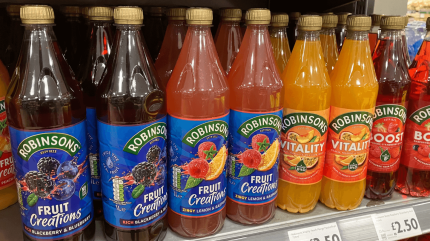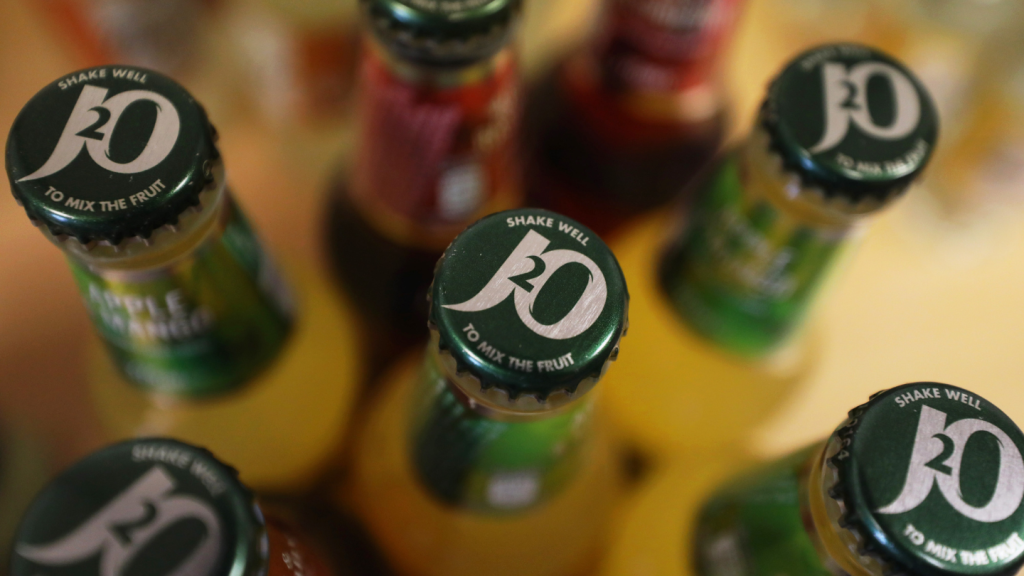
Last week, Britvic revealed it had rejected two multi-billion-pound takeover bids from Carlsberg earlier in the month.
The second, improved offer amounted to circa £3.2bn ($3.9bn) for the UK soft-drinks business.
Today (24 June), Carlsberg revealed it had reached an agreement with PepsiCo to waive a change-in-control clause in bottling arrangements PepsiCo has with Britvic.
The Danish brewer explained: “This waiver will come into effect should an acquisition of Britvic by Carlsberg, which has the recommendation of Britvic’s board, proceed to completion.”
Carlsberg has until 19 July to confirm whether it will return for a third bid for the Robinsons squash brand owner. However, according to The Times, it is understood that the beer maker will make a new offer.
The news of a potential deal has been met with mixed responses, however. The announcement on Friday (21 June) led to Carlsberg’s shares sliding 9% by the close of the day while Britvic’s shares jumped by the same amount.

US Tariffs are shifting - will you react or anticipate?
Don’t let policy changes catch you off guard. Stay proactive with real-time data and expert analysis.
By GlobalDataCarlsberg’s diversification play
As the Tuborg brewer reportedly readies a third bid for Britvic, some eyebrows have been raised over the rationale for the deal as Carlsberg looks to diversify its portfolio away from beer.
In February, following the group’s full-year results for 2023, Carlsberg CEO Jacob Aarup-Andersen discussed the company’s Accelerate Sail strategy, which includes a focus on the group’s Beyond Beer segment. The group increased its growth ambitions from 3% to 5% organic sales growth CAGR to 4% to 6% in its 2024 financial year.
Francois Sonneville, Rabobank food and beverage analyst, tells Just Drinks: “The beer landscape is changing and we have re-entered a time where portfolio diversification is in fashion again.
“Not that long ago (well, actually 15 years), companies like C&C Group divested soft-drinks assets to increase focus within the company. Brewers usually have a great distribution footprint and with volumes in mature markets declining, these distribution assets can be leveraged or sometimes need to be leveraged to prevent under-utilisation.”
However, Sonneville warns, the diversification journey is not always smooth sailing.
“Divisions inside conglomerates are fighting for airtime when sales representatives are on the road. At Coca-Cola, it is always difficult to be front of mind if you are not the iconic Cola brand. Great to have a nice niche brand do well, but the real battle is in the mainstream category.
“[It was] not surprising to see Heineken divest Vrumona, or Friesland Campina divest Riedel. These businesses have (or will have) the potential to flourish under a new owner when attention is given. The Babe wine initiative of AB InBev also comes to mind. Here today, gone tomorrow.”
Carlsberg already markets its own soft drinks, with brands including Tuborg Squash Light in Denmark, Tuborg Soda in Greece and Xixia in China.
Richard Wyborn, partner at Food Strategy Associates, questions the move into the soft-drinks market in the UK, though concedes it would allow Carlsberg to “capture some synergies in distribution and back office”.
He says: “It’s also a pretty substantial bet adding to the leverage of the company, limiting flexibility to do deals in the future, and also materially increases exposure to soft drinks and the low-growth carbonated soft-drink market in the UK.”
Wyborn adds: “The share price movement decline that followed the announcement suggests that investors are equally confused by the move.”
A distribution play?
Carlsberg is also the distributor of PepsiCo drinks in Norway and Switzerland. Britvic, meanwhile, handles PepsiCo’s beverages in the UK and Ireland, leading some to suggest distribution could be a major influence on Carlsberg’s move.
Kevin Baker, head of global beer and cider research at Just Drinks’ parent GlobalData, says the move is “very much a local deal to do with distribution in the UK rather than a major strategic move, although it does align with brewers moving beyond beer”.
Sonneville, however, says: “For Carlsberg, they are a bit stuck. Buying something small in soft-drinks would not move the needle. Buying Britvic creates a strong UK beverages platform, but not much in other markets.
“To start adding a mature soft-drinks market to a beer portfolio at risk of being called mature as well is risky and capital spend is substantial. The first move in soft-drinks needs to be absolutely right and shareholders are unconvinced.”
Moving away from China
Laurence Whyatt, head of European beverages research at Barclays Investment Bank, suggests an acquisition of Britvic would allow Carlsberg to venture away from a “slowing” China market.
After Carlsberg’s operations were seized by Russia last July, China has become its largest market, which Whyatt estimates accounts for 20% of group sales.
“Carlsberg has been looking at M&A consistently over the past few years. There have been some successes, like Carlsberg’s Marston’s JV (May 2020) and Waterloo Brewing in Canada (March 2023). However, there have been a few failures, notably Habeco in Vietnam where Carlsberg pursued the asset for many years with no success, and London Fields Brewery which was acquired in 2017 and then subsequently closed in 2021.
“Significantly, Carlsberg has also lost management in its Russian business, which was set to be sold until the Russian government took control of the assets in July 2023. Prior to the outbreak of the Russia/Ukraine conflict, Russia was Carlsberg’s second-largest market and accounted for circa 9% of revenue. Losing this geography made Carlsberg’s exposure to China even more significant.”

He also claims that Carlsberg’s management have said that they would like to diversify away from China to focus on markets where they already have operations.
“There are few brewing assets of scale in Europe that Carlsberg could acquire that are available and wouldn’t attract anti-trust concerns. This is why we believe Carlsberg has expanded its search to include soft-drinks businesses within Europe, of which Britvic is one of the leading examples and is of a size that would make a difference to Carlsberg’s existing business,” he said.
A smart move for Carlsberg?
The approach to acquire Britvic has been labelled as “strange” and “odd” by some industry players, as it is a substantial offer for a non-core acquisition.
Whyatt says Carlsberg’s UK business is not anywhere close to its Swiss or Scandinavian markets, where it is firmly in the top-two beer brands.
However, in the UK, Carlsberg only holds around a 7% market share, according to Whyatt, and is the fourth biggest player.
“Therefore the idea of dropping a bottling business onto an existing strong beer operation isn’t what is happening here – on our calculations, Carlsberg’s UK business is circa 30% smaller than Britvic’s, meaning that we are attaching a brewing operation to an existing soft-drinks business rather than the other way around.”
He adds that potential gradual profit accretion, increase of scale in the UK and lowering group reliance on China, and potential synergies from combining distribution are all good-looking “on-paper” benefits. However, there have been “plenty of examples of acquisitions that failed to deliver value to shareholders”.
Sonneville points to Royal Unibrew, which he said “has diversified successfully” following the €300m (then $327m) Vrumona purchase.
He notes: “Judgement is still out on Molson Coors, is it an all-beverage company?
“Carlsberg wants to become an all-beverages company and realises this is difficult when taking small steps. Britvic seems logical as it is in a familiar market and has familiar brands (Pepsi). Britvic itself though has seen that growth in the UK is difficult and has made acquisitions in France, and more recently in Brazil as well.”
Whyatt expresses concern the move might be the “best of the least attractive deals”. In other words, instead of increasing presence in South Asia or acquiring more big breweries in Europe, which would be higher on the list of priorities, he claims, “Britvic has become the most logical candidate”.
He thinks Carlsberg will have to make an offer of between £13 and £13.50 per share to be attractive to Britvic.
“Carlsberg’s initial offer was £12 and the second was £12.50. Carlsberg has already described this as a ‘very significant’ increase over the first offer. Therefore, to close the deal, we expect that Carlsberg would have to at least further increase the offer again by the same amount, or even twice that level.
“Given the first offer was a 24% premium to the undisturbed share price, the second a 29% premium, raising this to a 34-39% premium would be quite a stretch for the Carlsberg board to agree upon. However, this is more in line with historical acquisition premia in the UK market for deals of this size.”
While shareholders and analysts have been hesitant to cheer on the proposed deal, Sonneville claims: “Portfolio diversification is in fashion again.” Perhaps the Britvic move could prove the market wrong.



